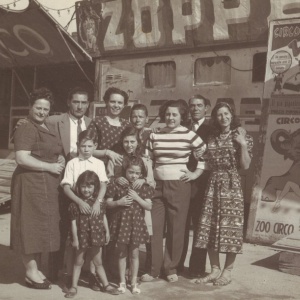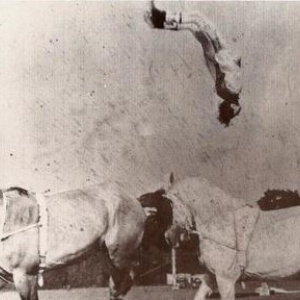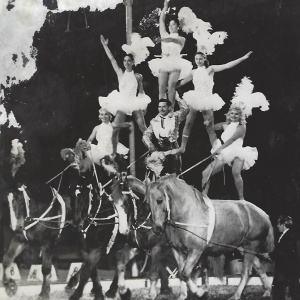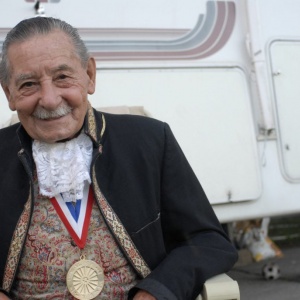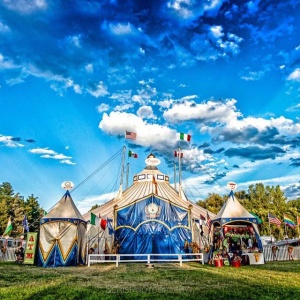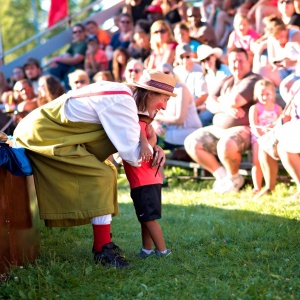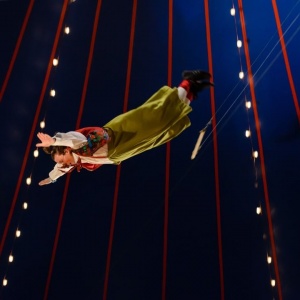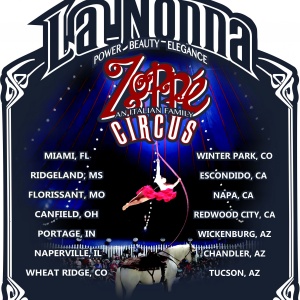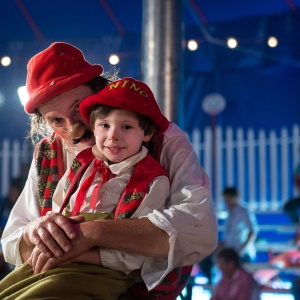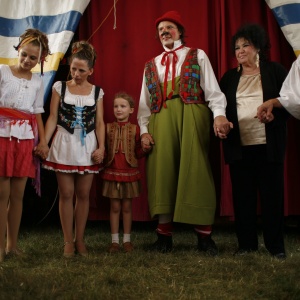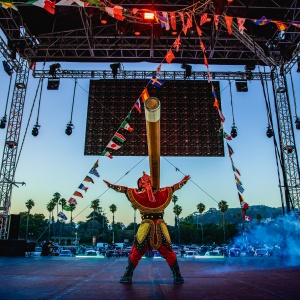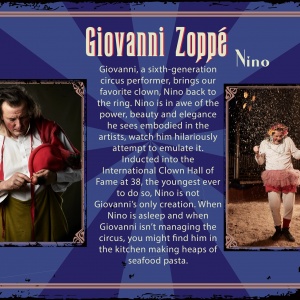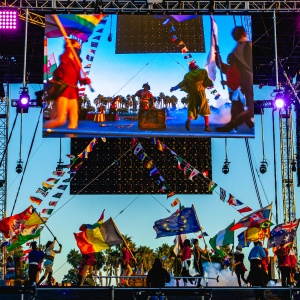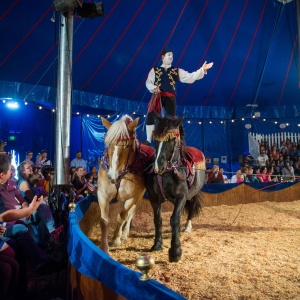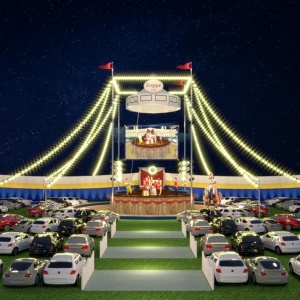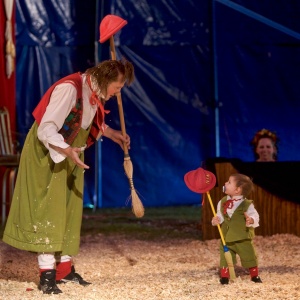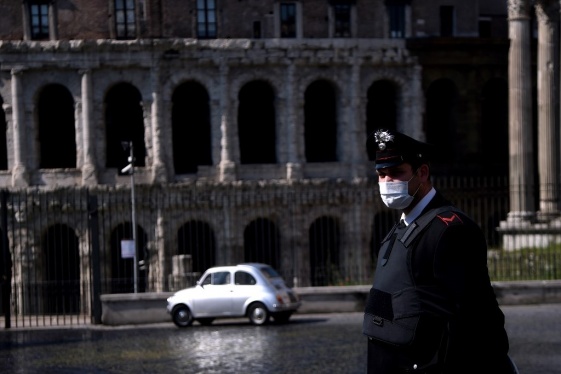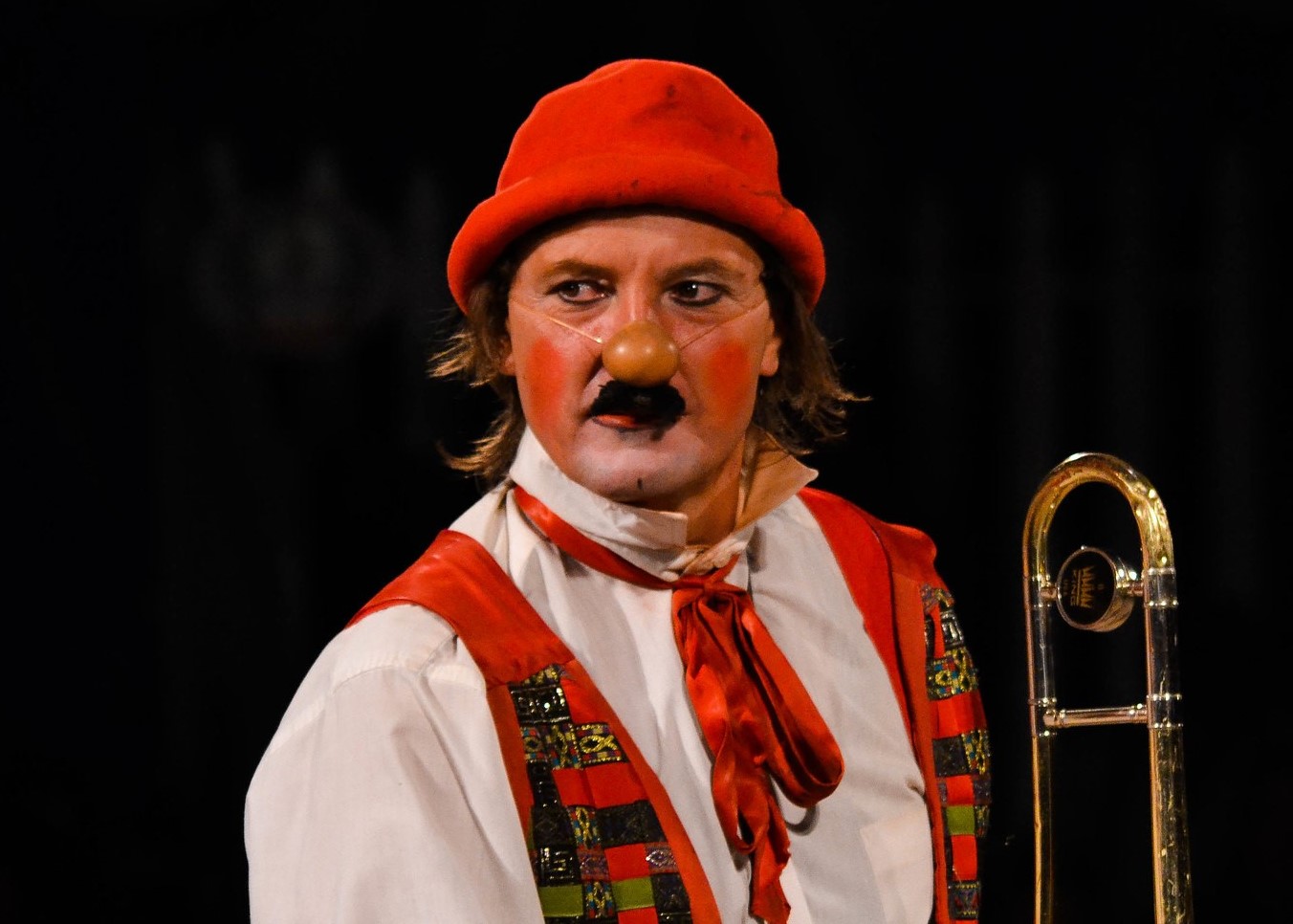
Giovanni Zoppè (Director of Zoppé Italian Family Circus)
Talento e amore, famiglia e tradizione: evviva Zoppè, il meraviglioso circo italiano negli USA

Often in the past, and this year is no exception, indeed, some of those who comment on the campaign for the American elections have described it as "a circus", using this term as derogatory. In reality, a circus is a difficult and exciting undertaking, a wonderful adventure and a school of life, an inspiring show full of talent and love, family and tradition.
Talent, love, family and tradition are perfect words to describe the Italian American experience: and today We the Italians is particularly happy to host a great Italian in America, an artist and an entrepreneur, a leader who has circus in his DNA, heir of generations of Italians who first in Italy and then in America have spread joy and happiness to millions of people. It is an honor and a privilege to welcome here with us Giovanni Zoppè, director of the Zoppé Italian Family Circus.
Giovanni, the 178-years old story of the Zoppè Family Circus would be a perfect plot of a movie: you have talent and tragedy, the Spanish flu and coronavirus, war bombings and travels all over the world, Orson Welles and Fidel Castro. Can you tell us how it was born, and how it evolves to the present day?
To tell my family’s story from the real beginning would take me too long because I have proofs that my family actually started in 1720, we are seven generations, so we should go back another 300 and some years. So, I actually take into considerations 1842 as the year in which our activity started, since then my family came back together and they created the show. During the Spanish flu, my family started doing movies, probably because circus was impossible to do. When the flu ended, they went back to the circus, a stable circus, with the arena. In those days, when the circus would come to town, it wouldn’t host just our shows: the arena would be the only place to organize events in town, and so it would also host boxing, theater shows, even political events and all sorts of public activities. It was the place where people used to go.
Then there’s story about the bombing. It is a very sad story of my family when they started bombing over the city during the second world war. My father used to tell me stories about that, I think they were in the North of Italy, I do not know exactly where, and they were working for the military. Once they had to run away from the circus and jump in the foxholes to protect themselves from the bombing. When they got back to check the circus, there were just flames and smoking ashes. My grandmother was on her knees crying and screaming and asking God why this happened! The main reason of her despair was that when they run away, there was no time to take the animals out. So the monkeys, the lions, the tigers, the bears, the horses were still in the cages but all burnt in the fire. To us, as to all circus’ people, animals are our life! We live with them, they are part of our family. This was a tragedy for my family but mostly for my grandmother who raised the animals from nothing. My grandmother took a pile of ashes and she rebuilt up the circus with five children! It was my grandmother to hold the reins of the show, she was the power of it.
About Orson Welles, my family was doing a show around Rome, where Orson Welles lived, and through him, the London Films, that was doing a movie on a circus, used my family circus as the backdrop for the movie. Orson Welles and my father became very close friends and the famous director was a friend of Cecil B. DeMille who was making a new film about circus called “The greatest show on earth”. So Welles contacted DeMille telling him about my father and his circus. DeMille was negotiating with John Ringling North in order to make the Ringling Circus the background of the movie. The two contacted my father and travelled to Italy in three different occasions inviting my father to come to America. But my father always refused because in 1947-1948 the circus was booming and my father was the star of the show, he was the one who was selling tickets, the promoter, the director of the show and he could not leave his home. It took three times and the third time, my father said that he would have come. When he was taken to the airport to fly to America, they sat in a coffee shop and my father found out that the Ringling Circus had 52 elephants at the time: in Europe there were very few elephants, because of war. So, it would have been incredible for our circus to have an elephant, and then my father said that he would not go to America unless they would send an elephant to his circus. Of course, this caused an arguing between them which ended by a deal: they would send an elephant to my father’s circus only if he was able to pay the freight, and in that case he could also keep it. The cost was 250 dollars but he had American Express to make advertisement and to pay for it. So the elephant went to Europe and stayed there, while my father went to America and he stayed in America.
About Fidel Castro: my father was producing a show for Ringling in Cuba when Fidel Castro took over, and all our artists were scared. Therefore, my father said it was about time to go back to America. Castro’s military didn’t like Americans and they were awful to them. That’s why my father said to the members of the circus: “All of you behind me! And whatever they ask you, you just say: si, si, si, si, we are all Italians!” So he took the whole troop out of the parking area and they kept on going and they were stopped many, many times and questioned : “Who are you? Where are you going?” and they all always answered: “Sono Italiano! Tutti Italiani here and andiamo all’aereo. Si, si, si” and then they all got on the plane. The plane was ready to take off, the engine started, and then Cuban police stopped the plane. My father and everybody in the plane were very scared. Someone from Castro’s military came on board and looked around, and they pulled one guy, a clown, out of the plane. They took him for a couple of hours. Circus’ people were scared to death not knowing what it was going to happen. Then the door opened and the police pushed the guy back on the plane and they finally took off. They went back to Miami and as they arrived they kissed the ground.
Family is a fundamental part of the Italian life, why family life connect so well in circus? A circus is a family, am I right? Is that why you created a show called “La Nonna”?
Yeah, circus is so tight, we live together, we are part of a community. So it is more than a bound, it’s a real family. That’s the reason why I say that circus and family are the same word.
About “La Nonna”, this show started mostly because of what I said before: it was my grandmother who kept the family and the show alive. Most of the Zoppè women were and still are very strong, nowadays my sister Tosca is struggling to keep our name up and alive. That’s why I chose La Nonna; actually I was starting with “La Donna”, but then I thought that “La Nonna” was more about the Zoppè’s family. Of course it was about my Nonna, but also about the equality of everybody, it is about all of us, we are all in this together, we are in the same team and once we realize it, life is better for everybody. It is not about winning or losing the approval of someone, it is about being ourselves. So “La Nonna” started to be about equality, it is representing all women of today with the struggles they all have to go through. And also men have to struggle, but you know, women have to struggle to stay in this world.
How much is there of Italian in your show? I think your stage name is Nino, right?
Well, my father came to America in 1948, he used to go back three or four times a year, I still have family that lives up in the North of Italy. I probably have blood connections with at least ten to twelve Italian circus: so there is still a very strong connection to Italy.
I was born and raised in America, but my father taught me the traditions of Italian people, the family connections. I still don’t speak Italian fluently, but I believe I have an Italian heart.
The show is presented like an Italian show and in fact our family is stronger in Europe than in US, we welcome people from all over Europe. For us it’s like to invite the audience at dinner in our house and when the show ends we say goodbye to them. The Zoppè name is an antique circus name such as Cristiani, Zacchini, Casartelli, Togni, Orfei. I worked with the Orfei family a lot in order to understand the Italian culture of circus.
Within the Italian circus community the Zoppè’s name is really well respected because of the antique connection we have with Italian circus. To go back to what we have of Italian in our circus, there is always an Italian connection because of what we are, we have Italian feelings. This year we reached back to commedia, where the roots of all arts are. I have a great friend of mine studying in Italy at the Teatro Piccolo of Milan, and he is bringing the commedia into the multimedia drive-in circus more than ever before.
Let’s talk about this. Now you have to deal with Covid-19, and your Italian genius kicked in. What is the “multimedia drive-in circus”?
Well actually I started two or three years ago to design a drive-in circus for no real reason, just because I thought that it would have been something interesting. So, when Covid-19 started, I decided to exploit the idea I had, but there was no way for us to connect with the audience as we usually do. People in the car remained behind a car glass and it was too different from the circus we were used to, there was no connection. And I think that if there is no connection, there is no reason to do the show.
Then, I got in contact with a CBF production in California that was making some drive-in concerts and we collaborated realizing a show in which there are not just circus people acting on a stage, but there are also some LED screens that show the filming of the event. But there was still not enough connection between the public and the artists, fo4r me. So I talked to a friend of mine in NY who is a film maker and has a lot of historical films of my family together. We made a short film to mix, during our show, with live entertainment. This is how we managed to create a connection! The last show we did, I was backstage as the horse act was performing, watching the cars, the horses and the screens. I just stopped myself looking down seeing people smiling to me and I could feel the energy of the audience and the connection we had, it was an amazing feeling and I started to yell down to my circus family: “We dit it! We did it!.”
One day, we will beat Covid-19. How do you see the future of Zoppè Family Circus after that? Maybe there will be technology and innovation in the circus world?
I agree, we will beat it. The problem is that it will be really tough to bring the audience back to the circus. I’m not saying that it was not already tough, because it actually was. But the Zoppè’s future is in its past, there is nothing that I can do better than what my ancestors did. I think the only future that our family has is what it has already done. I mean, it is possible to mix circus and technologies and still make it work, but in the future, I don’t know if I really would like to have screens. Technology is fantastic, we need it, but the circus it’s something real, something emotional: it’s spiritual and I think that technologies ruin this magic. Therefore, I don’t think that the Zoppè’s family will have more technologies that we have today.
Last question. You are the director of the Zoppè Family Circus, but you also are a circus clown. The figure of the clown has something poetic and revolutionary, which refers to ancient times and at the same time communicates an approach to life that transfers an increasingly necessary lightness. What is a clown's life like? And on this too, is there something Italian that helps you to interpret such an exceptional and indispensable character?
There is an old story that explains a clown’s life pretty good. It is about a person going to his therapist and saying to him “I’m sad, I’m alone, I’m dying, I have nobody, I’m devastated”. His therapist replies to him: “You know what? There is the fantastic clown Bobo who is going to perform next week in town. Go see Bobo and all of your pain and hurt will go away!”. And then the patient looks at his therapist and says: “I’m Bobo”.
The connection to Italy actually helps me in what I do. For instance, my father used to tell me some stories about my uncle Rodolfo, who was a clown too. He used to have a pocket watch on his costume’s show and he walked in the middle of the ring started staring at the audience around him. Then he took the pocket watch out and started flipping it with his fingers up and down. People were just watching him doing practically nothing but, all of a sudden, someone in the corners started laughing and then the whole audience started laughing really hard as well. He just looked at them, put his pocket watch away, turn around and walk away. That’s a clown.
It is true that in my work I might be classified as a clown but firstly I’m a human, I’m a person, I’m the director of the circus, I am part of a big family, in art we don’t have labels, we are all the same.
You may be interested
-
'A summer without travel': How long will Ital...
As the Italian government prepares to bring in “phase two” of the national lockdown measur...
-
'Alone': How Italian town with 1st known viru...
Italy delivered the first shocking confirmation of locally transmitted coronavirus infecti...
-
'Buffalo lost a part of its soul': Joey Giamb...
The first line in the email said everything. "Buffalo lost a part of its soul yesterday wi...
-
'Food helps': The coping strategies getting p...
For those struggling with lockdown in Italy right now - or the prospect of it elsewhere -...
-
'Have hope': Andrea Bocelli treats fans to in...
Andrea Bocelli is making hearts melt once again. The celebrated Italian tenor delivered a...
-
'I Pooh' historic member dies of Coronavirus
Stefano D’Orazio, historic member of the famous Italian band I Pooh, has died of Coronavir...
-
'I'm not worried, even though I really am': L...
The people in our village of 1400 in east-central Italy are very friendly and gregarious....
-
'It's like a slice of normal': Capers & Lemon...
There was a moment back in March when Carl Georigi thought his six Delaware restaurants wo...





